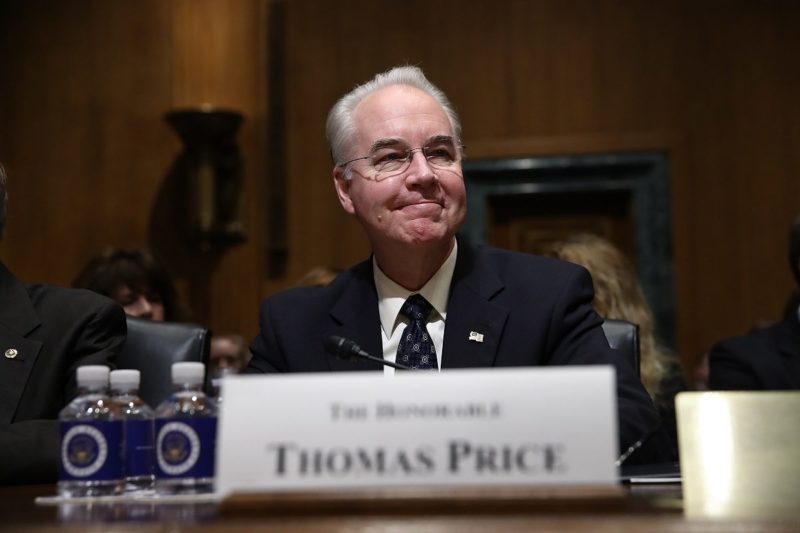Trump’s HHS Pick Disregards Impact of Defunding Planned Parenthood
Rep. Tom Price (R-GA), who has voted to defund Planned Parenthood, denied the nonpartisan Congressional Budget Office's finding that almost 400,000 people could lose access to care if Planned Parenthood was defunded.

Rep. Tom Price (R-GA) faced questions about his record on reproductive health and his willingness to speak out against medical falsehoods during his Health and Human Services (HHS) secretary confirmation hearing on Tuesday.
Sen. Ron Wyden (D-OR) questioned Price about his record on reproductive health care during the hearing before the Senate Finance Committee, pointing to a report from the nonpartisan Congressional Budget Office (CBO) that found almost 400,000 people could lose access to care if Planned Parenthood was defunded.
“This is not my opinion. … This is the nonpartisan Congressional Budget Office,” Wyden said. “You’re going to be the point person for health. Will you advise the president to reject any proposal that cuts coverage for, or otherwise limits a woman’s ability to see the provider that she trusts?”
Price denied that women would lose access to care should Planned Parenthood be cut off from Medicaid, insisting that the CBO’s analysis was not accurate because it looked at the issue in a “silo.”
Though Price didn’t say what the Republican plan would do to provide coverage for the hundreds of thousands of people who would lose access to care if Planned Parenthood were defunded, conservatives commonly suggest community clinics as the solution. While these clinics provide care for many, research shows that they would be unable to fill the gap created by defunding Planned Parenthood.
Price has repeatedly voted to defund Planned Parenthood.
“Women are going to lose access to those vital cancer screenings, and that is not a partisan statement,” Wyden told Price.
“I respectfully disagree with that conclusion,” Price replied.
Price acknowledged early in the hearing that abortion does not cause breast cancer, after fielding a question from Sen. Bob Menendez (D-NJ). “I think the science is relatively clear that that’s not the case,” Price said.
Price, however, is a member of the Association of American Physicians and Surgeons—a fringe anti-choice medical association that promotes the false link between abortion and breast cancer. The group has promoted medically and scientifically unsupported positions on vaccinations and HIV/AIDs.
“You’re going to head a department where science, not alternate universes of people’s views, is going to be central to a trillion dollar budget and the health of the nation,” Menendez said, asking Price whether if confirmed he would “swiftly and unequivocally debunk false claims to protect the public health.”
“What I’ll commit to doing is doing the due diligence that the department is known for and must do to make certain that factual information is conveyed to the president and the American people,” Price said. He added that this information would “without a doubt” be grounded in science.
Price co-sponsored multiple versions of the House’s unconstitutional 20-week abortion ban based on the discredited claim that a fetus feels pain at this point in gestation.
Sen. Ben Cardin (D-MD) noted in the hearing that President Trump’s executive order reinstating the “global gag rule” and expanding it to all global health programs could hinder U.S. efforts to address maternal health, HIV/AIDs, and Zika prevention.
When asked what he would do to ensure the United States “can fully participate in these global health efforts” if the gag rule is strictly enforced, Price said he would work with those at HHS to “determine what is the wisest policy for this nation to have as it relates in this instance to infectious disease.”
Sen. Sherrod Brown (D-OH) asked Price if he was willing “to set aside any personal political views and protect the doctor-patient relationship by committing to ensure every woman’s right to access the form of contraception deemed best for her by her doctor at no cost.”
“I think that contraception is absolutely imperative for many, many women, and the system that we ought to have in place is one that allows women to be able to purchase the kind of contraception that they desire,” he replied, though he offered no firm answer on the fate of the Affordable Care Act’s (ACA) birth control benefit.
Price sidestepped a question about his commitment to safeguard the benefit during testimony last week before the Senate Health, Education, Labor, and Pensions Committee.
Price in 2012 suggested that “there’s not one” person who would be unable to afford contraception without the birth control benefit, which requires employer-sponsored health insurance plans to cover it as preventive care at no cost to the consumer.
